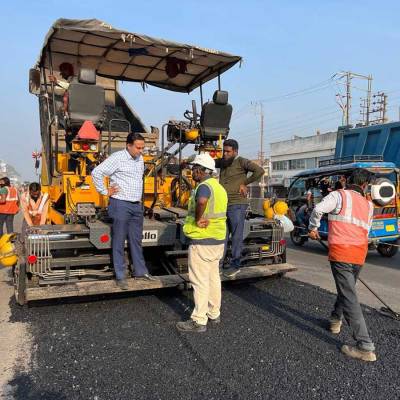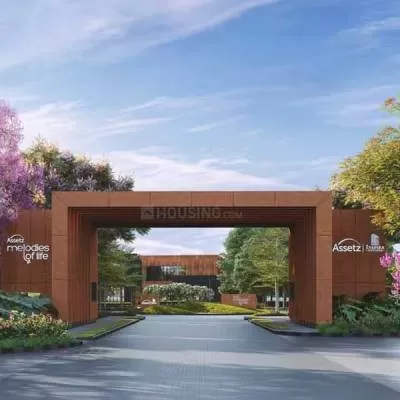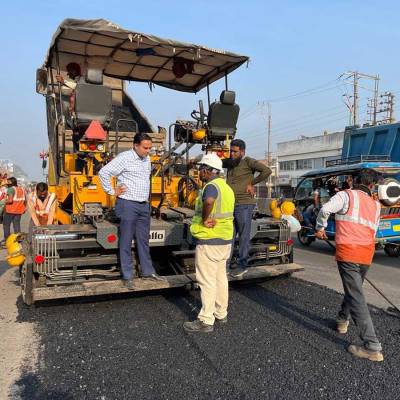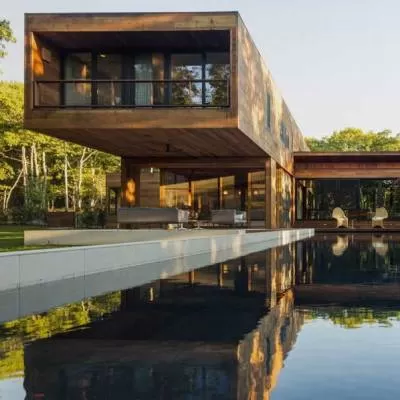- Home
- Real Estate
- Red Tape to Red Carpet?

Red Tape to Red Carpet?
We all know India needs an aggressive push for action. And now it appears the country is redesigning not just its existing cities but construction norms as well.
Global scoreboard
India made it to the World Bank's bottom five of the 190 countries in the case of dealing with construction permits. Not surprisingly, the multilateral lender's recent report states the country's inability to shift online its construction permit system, which entails more than 29 sets of procedures. To this effect, reports indicate that the Department of Industrial Policy and Promotion (DIPP) has asked more than 100 architects to point out problem areas. Shailendra Singh, Joint Secretary, DIPP, shares, 'Additionally, MoUD and municipal corporations have outlined reforms in terms of the requirements, what needs to be eliminated, the amount of time to be devoted to each project, etc.'
To begin with, things are getting easier in cities, with Delhi and Mumbai taking the lead - the World Bank ranking mainly considers the business environment in these two cities. Singh says, 'It is not just about reforms for the World Bank rankings, but implementation is crucial as well.' Now, 51 other cities with a million-plus population need to follow suit. In Mumbai for instance, the average time for approvals has reduced from 365 days to 23 days now. Also, the average time for both the commencement certificate and occupancy or completion certificate has reduced from 90 days to nine now (read more on page 56). Similarly, in Delhi (more on page 53), 2,100 building plans have been sanctioned online since April 2016. Of these, 30 per cent have been sanctioned within 72 hours, 28 per cent in four to seven days, and 42 per cent in eight to 29 days.
Rajiv Ranjan Mishra, Joint Secretary (Housing), Ministry of Housing and Poverty Alleviation, Government of India, confirms, 'Delhi and Mumbai are moving fast, and several major cities should have a similar approach. While many cities are already moving in this direction, the system may have not reached the scale of being completely online and integrated.' Calling this an exciting time for the construction and housing sector, he adds, 'If you look at our Housing for All guidelines, one of the mandatory reforms is that the states will have a single approval system with time-bound approvals. Owing to such reforms, I am confident many new projects will come in and there will be many more incentives for investors.'
States on the go!
DIPP along with the World Bank has also released a list of 405 business process reforms on which the states will be ranked. These reforms have been classified into 11 broad areas including construction permits, with an implementation deadline of October 31, 2017. In 2016, both Andhra Pradesh and Telangana topped the scoreboard with 98.78 per cent, followed by Gujarat in third position, Chhattisgarh fourth, Madhya Pradesh fifth, and Haryana coming in at sixth. Further, based on implementation of reforms, states have been divided in the four categories of Leaders (90-100 per cent), Aspiring Leaders (70-90 per cent), Acceleration Required (40-70 per cent) and Jump Start Needed (0-40 per cent) (see table below).
'States are also competing with each other to get investments and there is a lot of positive development happening in various states,' says Mishra. He shares, for instance, that Telangana sanctions permits upon just self-declaration in some cases. 'This is certainly brining good results for the state.' He further adds that in many cases, if the local administrator does not give the permission quickly and crosses the time, the state has put up the concept of deemed approval.
According to DIPP's assessment of state implementation of business reforms in 2016, several states have allowed applicants to apply online and upload building plans for automated construction permit approval. In addition, several states have developed AutoCAD-based systems that automatically scan building plans and monitor compliance with byelaws and building codes in force. These states include Andhra Pradesh, Chhattisgarh, Gujarat, Haryana, Madhya Pradesh, Maharashtra, Rajasthan, Telangana and Uttarakhand. And, as Singh mentions, 'We have asked all states to follow the reform systems implemented by Rajasthan and Chhattisgarh because online systems here, have proved to be most effective.'
Indeed, states are becoming increasingly proactive across the board. SS Rajpoot, Director, National Institute of Governance and Urban Management, Government of Madhya Pradesh, says, 'We have already made building permissions online for 14 municipal corporations, which includes about 45 per cent of the urban population. For the rest of the towns, we have already finalised the tender for Phase-2 and it should roll out in another four to five months.' And Gajanand Ram, Town Planner, Urban Development and Housing Department, Government of Jharkhand, says, 'Within the state, manual submission of building plan has been discontinued and an online approval system has been enforced. Also, a building plan approval management system (BPAMS) is in place.' He further updates that the 'trust-and-verify' model of the building approval system is going to be operationalised in Jharkhand within a month.
As mentioned above, Telangana and Andhra Pradesh have been making their mark by relentlessly working towards making the permit system speedier. 'The single-window system of Telangana - TSiPASS - which is now well known across the country, had incorporated online issue of approvals for industrial buildings in 2015,' shares Jayesh Ranjan, Principal Secretary, I&C and ITE & C, Government of Telangana. 'The same was extended to all buildings by respective departments in 2016 as per DIPP's Business Reforms Action Plan 2016.' Further, guided by visionary leadership, Andhra Pradesh aspires to be the most sought after investment destination in India. 'As part of Single Desk Policy 2015-20, the state government launched the Single Desk Portal in April 2015,' says Ajay Jain, Principal Secretary, Infrastructure & Investment Department, Government of Andhra Pradesh. 'The one-stop shop is helping industries obtain more than 39 regulatory clearances (including construction permits) required to set up and operate a business in 21 days. More than 17,500 industry applications have been cleared by the Single Desk Portal since its launch.'
In fact, these two states are establishing real-time case studies for other states to adopt (or add to their existing offerings). Here's how!
Telangana - Building approvals in 14 days
The state, which ranked No. 1 in India for implementing DIPP reforms in 2016, is confident about meeting DIPP's deadline of October 31 this year. 'Very few additions were made under 'Construction Permit Enablers' in 2017 compared to 2016,' says Ranjan. He shares some of the changes: 'Online approval system without physical interface; online tracking of application; fire NOC within seven days and buildings below 15-m height exempted; tree-cutting permission issued online by Forest Department; online registration of construction workers; online inspection system and report to be uploaded within 48 hours; and streamlining of application procedure including attachments.'
Greater Hyderabad Municipal Corporation (GHMC), Hyderabad Metropolitan Development Authority (HMDA) and Director of Town and Country Planning (DTCP) now issue approvals through a Development Permission Management System, which ensures building plan approvals are given online and within prescribed timelines. Ranjan adds, 'With GHMC, HMDA and DTCP issuing approvals online, in effect approvals across the state are given online now. Systems are being built on the concept of 'minimum inspection and maximum facilitation'.' For instance, in HMDA, change of land use, which used to take a minimum of 90 days earlier, has been brought down to 30 days. Also, building plan approvals are issued within 14 days.
'All industrial and commercial buildings with an investment of at least Rs 50 crore are getting clearances under TSIPASS within set time limits through an end-to-end online system,' informs Ranjan.
'For other buildings, GHMC had introduced e-Town Planning in 2014 itself, and has further refined it with a complete online system including tracking of application.' He avers that the online systems don't just ensure ease of application but brings about transparency, accountability and graft-free administration. Efforts are being made to further simplify systems by integrating the efforts of all line departments in construction approval like local bodies, fire department, forest, etc. 'Timelines will also be brought down further and third-party certification and self-certification strengthened.'
Andhra Pradesh - Online DPMS across 110 cities and towns:
Having achieved No. 1 position on the 'Ease of Doing Business' ranking along with Telangana, Andhra Pradesh has implemented almost all DIPP 2016 reform recommendations concerning construction permits and single-window system. With the enabling framework in place, 'the state is poised to fully comply with reform recommendations of DIPP 2017 within the timeframe of October 31ö, says Jain.
The state government has implemented sweeping reforms to not just remove regulatory hurdles but simplify the approval process of construction permits. Foremost among the reforms is, as Jain shares, 'the implementation of an online Development Planning Management System (DPMS) in March 2016, which has enabled a conducive ecosystem for clearances required for construction.' He adds, 'The application for construction permit along with other construction enablers such as water and electricity can be submitted through the Common Application Form (CAF) on the Single Desk Portal, and the permit obtained within seven days.' Since its launch, over 1,000 industrial construction permits have been granted through the DPMS system.
'The DPMS system has been implemented across 110 cities and towns (urban local bodies or ULBs) in the state including the cities
of Vijayawada, Visakhapatnam, Guntur and Tirupati,' informs Jain. He further adds that a large chunk of online construction permits via DPMS were granted from these four cities. With special emphasis of developing industrial cities, the state government is ensuring that all construction permits are granted within the stipulated timeframe.
Further, a Joint Inspection Committee has been established to carry out inspections by various government authorities responsible for granting single-point construction permits at all ULBs and IDCs. This is especially applicable in large cities, where permissions from multiple authorities such as airports, railways, fire, etc, become essential. Also, as Jain says, the state has allowed third-party certification of structural designs or architectural drawings during the construction or completion stage. Thus, each ULB has authorised several qualified structural engineers and architects to certify the designs. The third-party certification has made the entire process, from concept to completion of construction (of large commercial projects), much simpler and faster.
The new Andhra Pradesh Building Rules 2017 mandates the submission of building permits online substantiated by a simplified or standardised approval process across all agencies and areas.
'The government is planning to extend the ambit of the Joint Inspection Committee to grant all permits required for construction of commercial or factory buildings at a single go,' adds Jain. 'In coming months, the state is planning to further improve the construction permit system by reducing the documentation required and enable a robust service delivery charter (timelines) for all construction-related permits.' Efforts are also underway to extend online DPMS services to other areas or agencies (such as factories).
While this is the state of states, is this reflecting in the pace of execution of projects within cities? CW connects with the building industry for a reality check.
QUICK BYTES
- Mumbai: Average time for approvals reduced from 365 days to 23 days.
- Delhi: 2,100 building plans sanctioned online since April 2016.
- Several states have allowed online applications and automated permit approval in India.
- Government should appoint architects' panel for scrutinising developer submissions.
- Need for Right to Services Act to track delays in approvals.
Delhi: Over 25,000 Plans Sanctioned Online
In Delhi, there used to be as many as 11 NOC agencies, and the applicant had to seek clearance from every organisation. Dr Aqil Ahmed, Executive Engineer-Ease of Doing Business, Municipal Corporation of Delhi, talks about the changes brought about under the leadership of Puneet Goel, Commissioner, South Delhi Municipal Corporation.
We have integrated all the NOC agencies in a single-window clearance system.
The applicant can apply through the common application form on the portal.
Earlier, it took 30 to 60 days to sanction a building plan in Delhi. Everything is now done online, which makes monitoring easy. All the required details are available on the website.
The new system has been in place since April 2016. About 2,600 applications have been received, of which over 2,300 applications have been sanctioned and released.
Earlier there was a clause of deemed sanction if the department did not revert within 30 to 60 days. Owing to this, a number of plans were deemed sanctioned in November. And, in the past four months, the average time has been reduced to seven to eight days. Unlike earlier times, where it took months and years to receive the NOC, these are supposed to be submited within 15 days of receiving the application.
Now, there is also a system of risk-based assessment. In the low-risk category of buildings, simply give us the information and the information itself is the sanction. The power to sanction has been given to the architect. And we consider projects that fall in the categories of moderate and high risk. This is a big reform in itself as we have started trusting architects and professionals.
In terms of the number of authorities, the challenge in Delhi is that some agencies are under the Delhi Government and some under the Central Government. It was a big challenge to bring them all under a single umbrella. Now, NOCs are being applied and issued seamlessly without visiting any office.
From April 8 to March 31, the average time taken is about 18 days. Infact, if you consider the time of sanction in the past four months, it comes to around seven to eight days, which means the system has stabilised and people have learnt it and started using it. This is a big achievement.
Earlier, from the World Bank's perspective, there were 29 procedures for building plan approvals and completion occupancy certificates in Delhi. These have been reduced to eight now.
This is the beginning. The online system has been running in Delhi since 2011, much before other cities. If you compare us with any other city, you will find our volumes are very high. Since 2011, we have sanctioned over 25,000 plans online in a phased manner. Being the capital city, we should set an example with reforms that can be replicated by the other municipalities.
Mumbai: Permit in 60 Days
The city of Mumbai has incorporated about 18-19 key reforms. Vinod Chithore, Chief Engineer (DP), Municipal Corporation of Greater Mumbai (MCGM), details some of them.
We have re-engineered the entire process, curtailed certain NOCs, and involved third-party auditors so the building project proponent can get the NOCs from the third-party consultants.
We have integrated our single-window system with the National Monument Authority and the Airports Authority, so that the project proponent can obtain these permissions online and need not approach the authorities separately.
Earlier, there were around 42 processes for obtaining a construction permit. With the online process, we have mapped eight processes and the entire construction permit throughout the construction cycle can be given within 60 days.
Reforms are also being implemented that will be completed by or before the end of May. These will mainly include integration with railway authorities, BEST, Reliance, Tata, Revenue Department, etc, so that the project proponent need not go to them for obtaining any NOC or permissions. These permissions can be obtained through the single-window system of MCGM.
We have classified buildings in Mumbai into three categories: Low, medium and high risk. While projects under all three are expedited through the online construction permit system, projects under 'high risk' take a little time. As there is risk involved, some parameters are to be examined properly.
We have mapped building plan approvals and completion and occupancy certificates within 15 days. In the past three to four months, these have been issued within 10 days too.
Our officers are duty-bound and services are also included under the Right to Service Act. So if the requirement is in order, approval certificates have to be issued within the time limit.
At the state level, the government will have a common DCR and software for building plan approvals in Maharashtra. That is also underway and will be introduced shortly by the state.
Reality Check
Single-window clearance has been the demand of the real-estate fraternity for a while now. States and cities are already on the go to make online single-window clearance a reality; this will help bring professional players into the sector with a focus on better administration and faster delivery timelines.
Sunil Sharma, Vice President-Marketing & CRM, Mahindra Lifespace Developers, says, 'Positive first steps are being taken via IT enablement of processes. Single-window clearances and fast-track approvals can further support improved project execution efficiency, with ensuing benefits to all stakeholders (including home buyers, developers and the supply chain community).'
Recording reactions
Are all builders and architects experiencing speedier approvals in their cities? According to Kishore Bhatija, Managing Director-Real Estate Development, K Raheja Corp, 'The MCGM has taken the entire system online, which is a great move, but one has to appreciate that these initiatives of IT enablement, need time to reach a stage of seamless execution.' MoEF has released a notification stating that a project up to a size of 150,000 sq m (16 lakh sq ft), meeting MoEF's specified conditions, can be approved directly by MCGM, which in Bhatija's estimate would take a bulk of projects out of the MoEF purview, reducing the number of approvals. 'While the basic idea has been to put the policy in place, percolating down the line took a little time,' says Niranjan Hiranandani, Managing Director, Hiranandani Group. 'There is a strong intent coming from the prime minister, chief minister and municipal commissioners.
Subsequently, you will see a huge change in the system, when it becomes operational.' Hiranandani confirms that the TCS project being executed by the company in Mumbai received approval in good speed.
But for Architect Sanjay Puri, 'Mumbai is by far the most difficult and complicated city for permissions.' He adds, 'With different rules for each part, rules have constantly been changing over the years without complete clarity.' His firm is currently executing projects in over 30 Indian cities, and Puri points out to Gujarat and Haryana as among the best states in terms of permission and clarity. 'Cities in these states follow the same rules and this has been the case since over a decade,' he adds. 'We have projects in Ahmedabad, Surat, Baroda and Vapi, all based on the same parameters.'
Puri refers to Maharashtra as a state with different rules within a city and talks of Mumbai having different rules for slum redevelopment, society redevelopment, South Mumbai, North Mumbai, Thane, and Virar-Vasai. 'Even a city like Pune has three different sets of rules depending upon the location of the project,' Puri shares. 'There are projects where we have had to revise designs more than 10 times owing to changing rules and interpretations in Mumbai. There is absolutely no ease of permissions.'
Meanwhile, offering a southern perspective, Om Ahuja, CEO Residential, Brigade, says, 'Bengaluru and Mysuru have better systems compared to other cities.' Speaking of Chennai, Bhatija says, 'Bulk of the approvals are sanctioned by the development authority. Further, only over a particular height, the building approval needs to go to the state government. So after the planning authorities give you a planning permit, you approach the corporation for a building permit.'
While Puri sees complete clarity in rules for Delhi, North major Prashant Solomon, Treasurer, CREDAI NCR, and Managing Director, Chintels India, says 'With not too much land left in Delhi, 99 per cent of the projects are coming up in Noida, Gurgaon or Ghaziabad or areas touching Delhi.
Land pooling and redevelopment projects are being spoken about. But much of this is yet to translate into reality.'
The loopholes
The industry demand for single-window clearance continues.
Ahuja says, 'One has to approach multiple authorities for clearances right from municipal body, fire, water, electricity and multiple agencies with one single building plan. A single- window can change the dynamics in the approval mechanism.' To this, Rohit Poddar, Managing Director, Poddar Housing and Development, a Mumbai-focused company, adds, 'It takes a long time to get the necessary approvals, in some cases up to three years. To migrate to an online system, you need robust software and approval of engineers sufficiently trained in handling an online approval system; currently, both are works in progress.' With his international experience of executing projects in Dubai, Montenegro and Dallas, Puri adds, 'In each of these countries, the permission comes from one single authority.'
Bhatija recalls the evolution of the approval process. He says, 'Historically, there have been various government departments handling different aspects. As the need for regulating different facets came up, they were naturally handled by different agencies like Airports Authority, environment ministry, pollution control board, etc -which began the issue of sequencing, losing the very essence of doing things with ease. However, he emphasises, 'Today the government understands the need; with the World Bank ranking and other factors, there have been meetings between the government and the developer associations to simplify the issues. The government is committed to reduce the number of approvals and to make it more IT enabled.'
Counting windows
Cities have varied approvals and processes.
Ahuja says, 'On an average, a minimum of 20-odd approvals are needed.' Narasimha Swamy N, Head-Sales, Marketing & Customer Service, VBHC, says, 'Depending on the size and location of the project, it could be between five and 15 different approvals; the time ranges from nine months to years.' Solomon adds, 'Specific to Gurgaon, approvals can take anything between a year and two. But there are different stages of approval, and certain approvals happen as the project evolves. So, it does not take one to two years to start the project; approvals come in alongside the development.' Poddar divides the nature of projects in Mumbai into two categories: Redevelopment (either that of a slum or an existing society) and open plot land. He shares, 'For redevelopment, approvals would be over 50 and take about two years. For open plot land, approvals would be between 25 and 60 and would take between six months and two years depending on the location of the project and the municipality it is located in.'
Affordable housing
Some states are fast-tracking approvals for the affordable housing sector. Listing 'Gujarat, Rajasthan, Madhya Pradesh, Telengana and, recently, even Uttar Pradesh with approval cycles typically being under 60 days,' Poddar says, 'Maharashtra is trying to put a single-window clearance mechanism in place for affordable housing.' For Rajesh Krishnan, Managing Director & CEO, Brick Eagle, the approvals process for affordable development is very much the same in most cases. 'However, there are exceptions from both sides,' he says. 'If you go to a place like Rajasthan, there is single-window clearance for affordable housing at no cost, which is brilliant.'
While, according to Swamy N, there is no difference in the approval timeline for any project, affordable or otherwise; Solomon mentions that projects in Haryana do not have to pay external development charges. He shares, 'Recently, CREDAI National, under the stewardship of its new president, announced 375 affordable housing projects, which is a great thing.' However, he adds that there has to be a serious dialogue between the government and the industry to streamline the actual physical process of doing it.
Recommendations
The intent is clear and the industry agrees that the execution has started. CW collates some additional suggestions from the industry experts:
Puri: Every rule should be clearly stated with no change for at least a 10-year period; if the permissions are not given within a month, it should be deemed that plans are in order and work can start - the way it is in Singapore.
Solomon: The approval process should be automated online and there should be a minimum amount of discretionary power.
Bhatija: 'We are not saying that we want to shortcut anything. We are just saying do not duplicate and to help with quick approvals.
Poddar: The government should appoint a panel of architects responsible for scrutinising the submissions of the developer. Subsequent to this, an online mechanism should be in place that provides all clearances within 60 days, failing which the developer can start construction. A Right to Services Act should be instituted that tracks delays in approvals.
While the government has been talking about change, the industry is still waiting to walk the single-window red carpet. It's time to slash the red tape.
CN Raghavendran, Managing Director, CR Narayana Rao (Consultants), believes, the whole ecosystem needs to be responsive to changing times. 'There must be a vision,' he says, as he shares some action points.
Rules must be easily understood and implementable in an objective and transparent manner. Public debate and consultation must be encouraged and balanced professional opinions should be given due diligence instead of being excluded or ignored.
Further, there is considerable mismatch in (a) the land records as between the government land and the official document (commonly known as here as Patta, Khatha, etc, with (b) the owner's possession in terms of the actual site survey/site particularly the trail passed on in successive sale deed/documentation. Owing to old methods of field survey adopted compared to the current technology available in terms of GIS and other precision electronic survey, the mismatch, many times, leaves the developer, the architect and the statutory body taking different viewpoints.
Of course, computerised land documentation based on GIS is taking place in a few cities and this process must become uniformly applicable for the entire country at the soonest.
If the rules are clear cut and transparent, including the manner in which the building area and the super built-up area, etc, are computed, an objective and impersonal review by the authorities based on appropriate software is possible. This is being attempted in multiple cities but the system is yet to be perfected.
The multiplicity of agencies who scrutinise and issue NOCs, etc, can all be brought under a single-window for a joint collective review by the authorities, as is being done in several countries.
NBC laid down model regulations and have improved upon these in the recent upgrade of NBC of India 2016. There must be workshops among various statutory authorities from all states or regions to adopt a uniform code; special requirements and considerations for each region can also be identified for specific requirement.
Builders and architects must show full commitment to the rules. Narrow advantages, if any, should not be a hidden agenda.
- SHRIYAL SETHUMADHAVAN
To share your views, write in at feedback@ConstructionWorld.in
- CW
- Construction
- DIPP
- Shailendra Singh
- MoUD
- Rajiv Ranjan Mishra
- Ministry of Housing and Poverty Alleviation
- Government of India
- SS Rajpoot
- BPAMS
- ULB
- IDC
- Commercial projects
- Andhra Pradesh Building Rules 2017
- Dr Aqil Ahmed
- Puneet Goel
- South Delhi Municipal Corporation
- Central Government
- Sunil Sharma
- Mahindra Lifespace Developers
- K Raheja Corp
- MCGM
India is redesigning its construction norms to make construction permits easier and speedier. CW connects with states, cities and the building industry to learn more. We all know India needs an aggressive push for action. And now it appears the country is redesigning not just its existing cities but construction norms as well. Global scoreboard India made it to the World Bank's bottom five of the 190 countries in the case of dealing with construction permits. Not surprisingly, the multilateral lender's recent report states the country's inability to shift online its construction permit system, which entails more than 29 sets of procedures. To this effect, reports indicate that the Department of Industrial Policy and Promotion (DIPP) has asked more than 100 architects to point out problem areas. Shailendra Singh, Joint Secretary, DIPP, shares, 'Additionally, MoUD and municipal corporations have outlined reforms in terms of the requirements, what needs to be eliminated, the amount of time to be devoted to each project, etc.' To begin with, things are getting easier in cities, with Delhi and Mumbai taking the lead - the World Bank ranking mainly considers the business environment in these two cities. Singh says, 'It is not just about reforms for the World Bank rankings, but implementation is crucial as well.' Now, 51 other cities with a million-plus population need to follow suit. In Mumbai for instance, the average time for approvals has reduced from 365 days to 23 days now. Also, the average time for both the commencement certificate and occupancy or completion certificate has reduced from 90 days to nine now (read more on page 56). Similarly, in Delhi (more on page 53), 2,100 building plans have been sanctioned online since April 2016. Of these, 30 per cent have been sanctioned within 72 hours, 28 per cent in four to seven days, and 42 per cent in eight to 29 days. Rajiv Ranjan Mishra, Joint Secretary (Housing), Ministry of Housing and Poverty Alleviation, Government of India, confirms, 'Delhi and Mumbai are moving fast, and several major cities should have a similar approach. While many cities are already moving in this direction, the system may have not reached the scale of being completely online and integrated.' Calling this an exciting time for the construction and housing sector, he adds, 'If you look at our Housing for All guidelines, one of the mandatory reforms is that the states will have a single approval system with time-bound approvals. Owing to such reforms, I am confident many new projects will come in and there will be many more incentives for investors.' States on the go! DIPP along with the World Bank has also released a list of 405 business process reforms on which the states will be ranked. These reforms have been classified into 11 broad areas including construction permits, with an implementation deadline of October 31, 2017. In 2016, both Andhra Pradesh and Telangana topped the scoreboard with 98.78 per cent, followed by Gujarat in third position, Chhattisgarh fourth, Madhya Pradesh fifth, and Haryana coming in at sixth. Further, based on implementation of reforms, states have been divided in the four categories of Leaders (90-100 per cent), Aspiring Leaders (70-90 per cent), Acceleration Required (40-70 per cent) and Jump Start Needed (0-40 per cent) (see table below). 'States are also competing with each other to get investments and there is a lot of positive development happening in various states,' says Mishra. He shares, for instance, that Telangana sanctions permits upon just self-declaration in some cases. 'This is certainly brining good results for the state.' He further adds that in many cases, if the local administrator does not give the permission quickly and crosses the time, the state has put up the concept of deemed approval. According to DIPP's assessment of state implementation of business reforms in 2016, several states have allowed applicants to apply online and upload building plans for automated construction permit approval. In addition, several states have developed AutoCAD-based systems that automatically scan building plans and monitor compliance with byelaws and building codes in force. These states include Andhra Pradesh, Chhattisgarh, Gujarat, Haryana, Madhya Pradesh, Maharashtra, Rajasthan, Telangana and Uttarakhand. And, as Singh mentions, 'We have asked all states to follow the reform systems implemented by Rajasthan and Chhattisgarh because online systems here, have proved to be most effective.' Indeed, states are becoming increasingly proactive across the board. SS Rajpoot, Director, National Institute of Governance and Urban Management, Government of Madhya Pradesh, says, 'We have already made building permissions online for 14 municipal corporations, which includes about 45 per cent of the urban population. For the rest of the towns, we have already finalised the tender for Phase-2 and it should roll out in another four to five months.' And Gajanand Ram, Town Planner, Urban Development and Housing Department, Government of Jharkhand, says, 'Within the state, manual submission of building plan has been discontinued and an online approval system has been enforced. Also, a building plan approval management system (BPAMS) is in place.' He further updates that the 'trust-and-verify' model of the building approval system is going to be operationalised in Jharkhand within a month. As mentioned above, Telangana and Andhra Pradesh have been making their mark by relentlessly working towards making the permit system speedier. 'The single-window system of Telangana - TSiPASS - which is now well known across the country, had incorporated online issue of approvals for industrial buildings in 2015,' shares Jayesh Ranjan, Principal Secretary, I&C and ITE & C, Government of Telangana. 'The same was extended to all buildings by respective departments in 2016 as per DIPP's Business Reforms Action Plan 2016.' Further, guided by visionary leadership, Andhra Pradesh aspires to be the most sought after investment destination in India. 'As part of Single Desk Policy 2015-20, the state government launched the Single Desk Portal in April 2015,' says Ajay Jain, Principal Secretary, Infrastructure & Investment Department, Government of Andhra Pradesh. 'The one-stop shop is helping industries obtain more than 39 regulatory clearances (including construction permits) required to set up and operate a business in 21 days. More than 17,500 industry applications have been cleared by the Single Desk Portal since its launch.' In fact, these two states are establishing real-time case studies for other states to adopt (or add to their existing offerings). Here's how! Telangana - Building approvals in 14 days The state, which ranked No. 1 in India for implementing DIPP reforms in 2016, is confident about meeting DIPP's deadline of October 31 this year. 'Very few additions were made under 'Construction Permit Enablers' in 2017 compared to 2016,' says Ranjan. He shares some of the changes: 'Online approval system without physical interface; online tracking of application; fire NOC within seven days and buildings below 15-m height exempted; tree-cutting permission issued online by Forest Department; online registration of construction workers; online inspection system and report to be uploaded within 48 hours; and streamlining of application procedure including attachments.' Greater Hyderabad Municipal Corporation (GHMC), Hyderabad Metropolitan Development Authority (HMDA) and Director of Town and Country Planning (DTCP) now issue approvals through a Development Permission Management System, which ensures building plan approvals are given online and within prescribed timelines. Ranjan adds, 'With GHMC, HMDA and DTCP issuing approvals online, in effect approvals across the state are given online now. Systems are being built on the concept of 'minimum inspection and maximum facilitation'.' For instance, in HMDA, change of land use, which used to take a minimum of 90 days earlier, has been brought down to 30 days. Also, building plan approvals are issued within 14 days. 'All industrial and commercial buildings with an investment of at least Rs 50 crore are getting clearances under TSIPASS within set time limits through an end-to-end online system,' informs Ranjan. 'For other buildings, GHMC had introduced e-Town Planning in 2014 itself, and has further refined it with a complete online system including tracking of application.' He avers that the online systems don't just ensure ease of application but brings about transparency, accountability and graft-free administration. Efforts are being made to further simplify systems by integrating the efforts of all line departments in construction approval like local bodies, fire department, forest, etc. 'Timelines will also be brought down further and third-party certification and self-certification strengthened.' Andhra Pradesh - Online DPMS across 110 cities and towns: Having achieved No. 1 position on the 'Ease of Doing Business' ranking along with Telangana, Andhra Pradesh has implemented almost all DIPP 2016 reform recommendations concerning construction permits and single-window system. With the enabling framework in place, 'the state is poised to fully comply with reform recommendations of DIPP 2017 within the timeframe of October 31ö, says Jain. The state government has implemented sweeping reforms to not just remove regulatory hurdles but simplify the approval process of construction permits. Foremost among the reforms is, as Jain shares, 'the implementation of an online Development Planning Management System (DPMS) in March 2016, which has enabled a conducive ecosystem for clearances required for construction.' He adds, 'The application for construction permit along with other construction enablers such as water and electricity can be submitted through the Common Application Form (CAF) on the Single Desk Portal, and the permit obtained within seven days.' Since its launch, over 1,000 industrial construction permits have been granted through the DPMS system. 'The DPMS system has been implemented across 110 cities and towns (urban local bodies or ULBs) in the state including the cities of Vijayawada, Visakhapatnam, Guntur and Tirupati,' informs Jain. He further adds that a large chunk of online construction permits via DPMS were granted from these four cities. With special emphasis of developing industrial cities, the state government is ensuring that all construction permits are granted within the stipulated timeframe. Further, a Joint Inspection Committee has been established to carry out inspections by various government authorities responsible for granting single-point construction permits at all ULBs and IDCs. This is especially applicable in large cities, where permissions from multiple authorities such as airports, railways, fire, etc, become essential. Also, as Jain says, the state has allowed third-party certification of structural designs or architectural drawings during the construction or completion stage. Thus, each ULB has authorised several qualified structural engineers and architects to certify the designs. The third-party certification has made the entire process, from concept to completion of construction (of large commercial projects), much simpler and faster. The new Andhra Pradesh Building Rules 2017 mandates the submission of building permits online substantiated by a simplified or standardised approval process across all agencies and areas. 'The government is planning to extend the ambit of the Joint Inspection Committee to grant all permits required for construction of commercial or factory buildings at a single go,' adds Jain. 'In coming months, the state is planning to further improve the construction permit system by reducing the documentation required and enable a robust service delivery charter (timelines) for all construction-related permits.' Efforts are also underway to extend online DPMS services to other areas or agencies (such as factories). While this is the state of states, is this reflecting in the pace of execution of projects within cities? CW connects with the building industry for a reality check. QUICK BYTES Mumbai: Average time for approvals reduced from 365 days to 23 days. Delhi: 2,100 building plans sanctioned online since April 2016. Several states have allowed online applications and automated permit approval in India. Government should appoint architects' panel for scrutinising developer submissions. Need for Right to Services Act to track delays in approvals. Delhi: Over 25,000 Plans Sanctioned Online In Delhi, there used to be as many as 11 NOC agencies, and the applicant had to seek clearance from every organisation. Dr Aqil Ahmed, Executive Engineer-Ease of Doing Business, Municipal Corporation of Delhi, talks about the changes brought about under the leadership of Puneet Goel, Commissioner, South Delhi Municipal Corporation. We have integrated all the NOC agencies in a single-window clearance system. The applicant can apply through the common application form on the portal. Earlier, it took 30 to 60 days to sanction a building plan in Delhi. Everything is now done online, which makes monitoring easy. All the required details are available on the website. The new system has been in place since April 2016. About 2,600 applications have been received, of which over 2,300 applications have been sanctioned and released. Earlier there was a clause of deemed sanction if the department did not revert within 30 to 60 days. Owing to this, a number of plans were deemed sanctioned in November. And, in the past four months, the average time has been reduced to seven to eight days. Unlike earlier times, where it took months and years to receive the NOC, these are supposed to be submited within 15 days of receiving the application. Now, there is also a system of risk-based assessment. In the low-risk category of buildings, simply give us the information and the information itself is the sanction. The power to sanction has been given to the architect. And we consider projects that fall in the categories of moderate and high risk. This is a big reform in itself as we have started trusting architects and professionals. In terms of the number of authorities, the challenge in Delhi is that some agencies are under the Delhi Government and some under the Central Government. It was a big challenge to bring them all under a single umbrella. Now, NOCs are being applied and issued seamlessly without visiting any office. From April 8 to March 31, the average time taken is about 18 days. Infact, if you consider the time of sanction in the past four months, it comes to around seven to eight days, which means the system has stabilised and people have learnt it and started using it. This is a big achievement. Earlier, from the World Bank's perspective, there were 29 procedures for building plan approvals and completion occupancy certificates in Delhi. These have been reduced to eight now. This is the beginning. The online system has been running in Delhi since 2011, much before other cities. If you compare us with any other city, you will find our volumes are very high. Since 2011, we have sanctioned over 25,000 plans online in a phased manner. Being the capital city, we should set an example with reforms that can be replicated by the other municipalities. Mumbai: Permit in 60 Days The city of Mumbai has incorporated about 18-19 key reforms. Vinod Chithore, Chief Engineer (DP), Municipal Corporation of Greater Mumbai (MCGM), details some of them. We have re-engineered the entire process, curtailed certain NOCs, and involved third-party auditors so the building project proponent can get the NOCs from the third-party consultants. We have integrated our single-window system with the National Monument Authority and the Airports Authority, so that the project proponent can obtain these permissions online and need not approach the authorities separately. Earlier, there were around 42 processes for obtaining a construction permit. With the online process, we have mapped eight processes and the entire construction permit throughout the construction cycle can be given within 60 days. Reforms are also being implemented that will be completed by or before the end of May. These will mainly include integration with railway authorities, BEST, Reliance, Tata, Revenue Department, etc, so that the project proponent need not go to them for obtaining any NOC or permissions. These permissions can be obtained through the single-window system of MCGM. We have classified buildings in Mumbai into three categories: Low, medium and high risk. While projects under all three are expedited through the online construction permit system, projects under 'high risk' take a little time. As there is risk involved, some parameters are to be examined properly. We have mapped building plan approvals and completion and occupancy certificates within 15 days. In the past three to four months, these have been issued within 10 days too. Our officers are duty-bound and services are also included under the Right to Service Act. So if the requirement is in order, approval certificates have to be issued within the time limit. At the state level, the government will have a common DCR and software for building plan approvals in Maharashtra. That is also underway and will be introduced shortly by the state. Reality Check Single-window clearance has been the demand of the real-estate fraternity for a while now. States and cities are already on the go to make online single-window clearance a reality; this will help bring professional players into the sector with a focus on better administration and faster delivery timelines. Sunil Sharma, Vice President-Marketing & CRM, Mahindra Lifespace Developers, says, 'Positive first steps are being taken via IT enablement of processes. Single-window clearances and fast-track approvals can further support improved project execution efficiency, with ensuing benefits to all stakeholders (including home buyers, developers and the supply chain community).' Recording reactions Are all builders and architects experiencing speedier approvals in their cities? According to Kishore Bhatija, Managing Director-Real Estate Development, K Raheja Corp, 'The MCGM has taken the entire system online, which is a great move, but one has to appreciate that these initiatives of IT enablement, need time to reach a stage of seamless execution.' MoEF has released a notification stating that a project up to a size of 150,000 sq m (16 lakh sq ft), meeting MoEF's specified conditions, can be approved directly by MCGM, which in Bhatija's estimate would take a bulk of projects out of the MoEF purview, reducing the number of approvals. 'While the basic idea has been to put the policy in place, percolating down the line took a little time,' says Niranjan Hiranandani, Managing Director, Hiranandani Group. 'There is a strong intent coming from the prime minister, chief minister and municipal commissioners. Subsequently, you will see a huge change in the system, when it becomes operational.' Hiranandani confirms that the TCS project being executed by the company in Mumbai received approval in good speed. But for Architect Sanjay Puri, 'Mumbai is by far the most difficult and complicated city for permissions.' He adds, 'With different rules for each part, rules have constantly been changing over the years without complete clarity.' His firm is currently executing projects in over 30 Indian cities, and Puri points out to Gujarat and Haryana as among the best states in terms of permission and clarity. 'Cities in these states follow the same rules and this has been the case since over a decade,' he adds. 'We have projects in Ahmedabad, Surat, Baroda and Vapi, all based on the same parameters.' Puri refers to Maharashtra as a state with different rules within a city and talks of Mumbai having different rules for slum redevelopment, society redevelopment, South Mumbai, North Mumbai, Thane, and Virar-Vasai. 'Even a city like Pune has three different sets of rules depending upon the location of the project,' Puri shares. 'There are projects where we have had to revise designs more than 10 times owing to changing rules and interpretations in Mumbai. There is absolutely no ease of permissions.' Meanwhile, offering a southern perspective, Om Ahuja, CEO Residential, Brigade, says, 'Bengaluru and Mysuru have better systems compared to other cities.' Speaking of Chennai, Bhatija says, 'Bulk of the approvals are sanctioned by the development authority. Further, only over a particular height, the building approval needs to go to the state government. So after the planning authorities give you a planning permit, you approach the corporation for a building permit.' While Puri sees complete clarity in rules for Delhi, North major Prashant Solomon, Treasurer, CREDAI NCR, and Managing Director, Chintels India, says 'With not too much land left in Delhi, 99 per cent of the projects are coming up in Noida, Gurgaon or Ghaziabad or areas touching Delhi. Land pooling and redevelopment projects are being spoken about. But much of this is yet to translate into reality.' The loopholes The industry demand for single-window clearance continues. Ahuja says, 'One has to approach multiple authorities for clearances right from municipal body, fire, water, electricity and multiple agencies with one single building plan. A single- window can change the dynamics in the approval mechanism.' To this, Rohit Poddar, Managing Director, Poddar Housing and Development, a Mumbai-focused company, adds, 'It takes a long time to get the necessary approvals, in some cases up to three years. To migrate to an online system, you need robust software and approval of engineers sufficiently trained in handling an online approval system; currently, both are works in progress.' With his international experience of executing projects in Dubai, Montenegro and Dallas, Puri adds, 'In each of these countries, the permission comes from one single authority.' Bhatija recalls the evolution of the approval process. He says, 'Historically, there have been various government departments handling different aspects. As the need for regulating different facets came up, they were naturally handled by different agencies like Airports Authority, environment ministry, pollution control board, etc -which began the issue of sequencing, losing the very essence of doing things with ease. However, he emphasises, 'Today the government understands the need; with the World Bank ranking and other factors, there have been meetings between the government and the developer associations to simplify the issues. The government is committed to reduce the number of approvals and to make it more IT enabled.' Counting windows Cities have varied approvals and processes. Ahuja says, 'On an average, a minimum of 20-odd approvals are needed.' Narasimha Swamy N, Head-Sales, Marketing & Customer Service, VBHC, says, 'Depending on the size and location of the project, it could be between five and 15 different approvals; the time ranges from nine months to years.' Solomon adds, 'Specific to Gurgaon, approvals can take anything between a year and two. But there are different stages of approval, and certain approvals happen as the project evolves. So, it does not take one to two years to start the project; approvals come in alongside the development.' Poddar divides the nature of projects in Mumbai into two categories: Redevelopment (either that of a slum or an existing society) and open plot land. He shares, 'For redevelopment, approvals would be over 50 and take about two years. For open plot land, approvals would be between 25 and 60 and would take between six months and two years depending on the location of the project and the municipality it is located in.' Affordable housing Some states are fast-tracking approvals for the affordable housing sector. Listing 'Gujarat, Rajasthan, Madhya Pradesh, Telengana and, recently, even Uttar Pradesh with approval cycles typically being under 60 days,' Poddar says, 'Maharashtra is trying to put a single-window clearance mechanism in place for affordable housing.' For Rajesh Krishnan, Managing Director & CEO, Brick Eagle, the approvals process for affordable development is very much the same in most cases. 'However, there are exceptions from both sides,' he says. 'If you go to a place like Rajasthan, there is single-window clearance for affordable housing at no cost, which is brilliant.' While, according to Swamy N, there is no difference in the approval timeline for any project, affordable or otherwise; Solomon mentions that projects in Haryana do not have to pay external development charges. He shares, 'Recently, CREDAI National, under the stewardship of its new president, announced 375 affordable housing projects, which is a great thing.' However, he adds that there has to be a serious dialogue between the government and the industry to streamline the actual physical process of doing it. Recommendations The intent is clear and the industry agrees that the execution has started. CW collates some additional suggestions from the industry experts: Puri: Every rule should be clearly stated with no change for at least a 10-year period; if the permissions are not given within a month, it should be deemed that plans are in order and work can start - the way it is in Singapore. Solomon: The approval process should be automated online and there should be a minimum amount of discretionary power. Bhatija: 'We are not saying that we want to shortcut anything. We are just saying do not duplicate and to help with quick approvals. Poddar: The government should appoint a panel of architects responsible for scrutinising the submissions of the developer. Subsequent to this, an online mechanism should be in place that provides all clearances within 60 days, failing which the developer can start construction. A Right to Services Act should be instituted that tracks delays in approvals. While the government has been talking about change, the industry is still waiting to walk the single-window red carpet. It's time to slash the red tape. CN Raghavendran, Managing Director, CR Narayana Rao (Consultants), believes, the whole ecosystem needs to be responsive to changing times. 'There must be a vision,' he says, as he shares some action points. Rules must be easily understood and implementable in an objective and transparent manner. Public debate and consultation must be encouraged and balanced professional opinions should be given due diligence instead of being excluded or ignored. Further, there is considerable mismatch in (a) the land records as between the government land and the official document (commonly known as here as Patta, Khatha, etc, with (b) the owner's possession in terms of the actual site survey/site particularly the trail passed on in successive sale deed/documentation. Owing to old methods of field survey adopted compared to the current technology available in terms of GIS and other precision electronic survey, the mismatch, many times, leaves the developer, the architect and the statutory body taking different viewpoints. Of course, computerised land documentation based on GIS is taking place in a few cities and this process must become uniformly applicable for the entire country at the soonest. If the rules are clear cut and transparent, including the manner in which the building area and the super built-up area, etc, are computed, an objective and impersonal review by the authorities based on appropriate software is possible. This is being attempted in multiple cities but the system is yet to be perfected. The multiplicity of agencies who scrutinise and issue NOCs, etc, can all be brought under a single-window for a joint collective review by the authorities, as is being done in several countries. NBC laid down model regulations and have improved upon these in the recent upgrade of NBC of India 2016. There must be workshops among various statutory authorities from all states or regions to adopt a uniform code; special requirements and considerations for each region can also be identified for specific requirement. Builders and architects must show full commitment to the rules. Narrow advantages, if any, should not be a hidden agenda. - SHRIYAL SETHUMADHAVAN To share your views, write in at feedback@ConstructionWorld.in
























